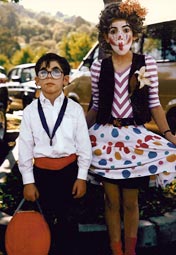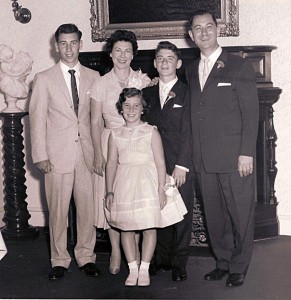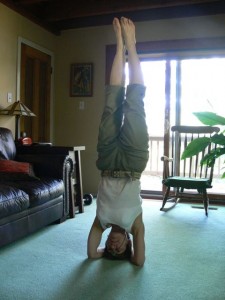|
|
October 30, 2009
 Does this really need a caption? Just pulled a batch of pumpkin muffins out of the oven. Don’t know who put them in there but I’m grateful as all get out! Watching those beauties cooling on the rack, I’m struck by the utter perfection of a muffin. Aromatic. Golden. Round. There’s a cosmic wholeness to each one those puppies.
When Fayette was 3, David and I took her on a weekend outing to Lake Tahoe with another couple and their two little boys. (Important Note: Unless you know people really well and like spending lots of time with them and their kids, or you’re actually looking for a way to end a friendship, do not go on vacation with another family.)
At a pit stop we hit a local bakery. I told my daughter to pick out anything she wanted from the enormous display case. After careful consideration she chose a giant cookie carpeted in rainbow sprinkles. Her eyes shimmered as I handed her the treasure. Holding it tenderly she seemed incredulous that something so beautiful belonged to her.
But before Fayette had a chance to nibble, the other mom (the one we were traveling with not my evil alter-ego) snatched the cookie away saying, “That’s too big for you to eat by yourself. Let’s share it.” Then she snapped it in two and handed half to her son and the other half back to my shell-shocked little girl who instantly erupted in dispair.
The Other Mom shot me one of those looks: “You must be a crappy mom to have such a spoiled brat.”
For the record, Fayette was never a brat. Part of the explanation is her naturally sunny disposition and I can’t take credit for that. The other part I can and will take credit for… the simple fact is that I am a great mom! But I digress.
Back in the bakery I totally got my daughter’s reaction. I almost cried too! In one swell foop, Fay’s perfect, whole treasure was reduced to… a crumbly mess.
We’ve (mostly) forgiven that woman’s misguided attempt to teach kids the joy of sharing. No seriously, she’s forgiven. Really she is!
We suffer a loss when something that ought to be whole is less than whole. As parents we often offer up just part of what we should be giving to our children. I know we’re stretched and stressed. But we still have the ability to deliver the whole. That would be our complete attention when our child wants to show us something (even when you have “a million other things to do”). It’s a completely open mind when your daughter needs to talk about something that’s worrying her (even if it makes no rational sense to you). It’s also a completely open heart when your son confesses to making a mistake or apologizes for messing up.
Please just give them the whole damn cookie. That’s what we signed up for. That’s what they need.
UPDATE: If an unemployed jack-o-lantern is loitering on your doorstep, here’s a great way to put that melon head to use while having fun in the kitchen with the kids:
Pumpkin Raisin Muffins (Thank you, Betty Crocker)
| 1 and 1/2 cups flour |
1/2 cup milk |
| 1/2 cup sugar |
1/2 cup pureed pumpkin
(Gotta cook it first. You knew that, right?) |
| 2 tsps baking powder |
1/4 cup melted butter |
| 1/2 tsp salt |
1 egg |
| 1/2 tsp cinnamon |
1/2 cup of raisins |
| 1/2 tsp nutmeg |
|
Preheat oven to 400. Grease muffin tin. Mix all ingredients just until flour is moistened. Fill muffin cups. Bake 18-20 min. Pop ’em out of the pan. Cool. Devour.
Happy Halloween weekend!

October 23, 2009
 When we're fakin' it for fun, it's a blast UPDATE (October 2013): This essay is included in my book, Teaching Kids to Be Good People. (Electric Eggplant, 2012)
I love Halloween. Always have. Even though our kids don’t live here any more, David and I still trawl the neighborhood, checking out trick-or-treaters and home makeovers. David usually wears his multimedia producer costume— understated, but totally convincing. Typically I pull out all the stops and morph into a mime with whiteface, red-bow lips, massive amounts of black eyeliner, and a pink tutu on my head.
My senior year in high school I was voted Class Actress, so I fully appreciate the fascination with taking on a new persona and milking it for all it’s worth. The irony isn’t lost on me that this Great Pretender has built a career exploring the MO of kids who constantly fake it by pretending to be someone they’re not, just to get other kids to like them.
I recently emailed a bunch of middle and high school students and asked: “How do you know when you’re faking it?” Here are some answers:
- “I have a feeling of guilt and hatred for myself. I feel like I’m a wimp for not speaking the truth.”
- “It’s hard for me to really shine thru and show people who I am because I am always worried about impressing them. I hate it when I act this way.”
- “I feel like a fraud in my own body. I feel betrayed by myself because I’m not showing everyone who I am and it hurts because I don’t know if they will like me for who I am.”
- “I get a nagging feeling tugging at the back of my brain, telling me ‘Don’t do this, you know this isn’t you.’”
- “Whenever I’m putting on ‘my mask,’ I feel sort of terrible and messy inside, like a lot of spaghetti, all tangled up. I feel almost sick to my stomach and a little anxious, but I still do it to impress others. But it never feels quite right. I do it because I feel like I’m not good enough sometimes.”
Their responses saddened me. We want our kids to be happy and self-assured. We want them to be courageous enough to drop the mask and confidently be themselves. But that’s a huge challenge when they’re unwilling to make a move without first checking out what everyone else is doing. If everyone else is being unkind, our children need tremendous strength of character not to join the hating party. Because the price of social poker is so very high, not many of them are willing to gamble.
Of course some kids embrace their authentic self and don’t hesitate to do the right thing. They show their goodness with equal confidence when no one is watching and when everyone is watching. But more kids need that kind of courage. Too many of them are Peer Approval Addicts, compulsively doing whatever it takes to fit in, including stuff they’re not proud of. For these children, everyday is Halloween, only they don’t get candy—just the hollow feeling of wimping out and not being “good enough” without their mask.
How can we help our kids resist conforming to negative peer behavior? By modeling and reinforcing, early and often, what authenticity looks like. By teaching that our choices matter and everyone deserves respect even when we’re feeling angry with them. Let’s talk about people in the news, characters in books, movies, TV shows, and anyone we know who did the right thing despite the risk that friends might not approve. Let our sons and daughters know that they already are “enough” of everything that matters. Remind them that they’ve got the courage to do the right thing, even when they’re not sure they do.
A week after my initial survey question, I followed up with this one: “How would your life be different if you didn’t have to worry what other people think?” Here’s what they said:
- “I’d probably share with people that ‘Hey, being yourself is cool, and if you can’t do this now… why not?’”
- “I would not spend a lot of money or do stupid things just to fit in.”
- “I would try out for football with the boys.”
- “I’d go to school in costume every day, dressed as a medieval knight, an astronaut, a soldier, or something totally new!”
- “I wouldn’t formulate the perfect words to say to those perfect people. I would say exactly how I feel.”
- “I would eat a cheesecake and wear a flannel vest. Woah! That would be a pretty darn cool world!”
- “I would love it! It would be like a freedom that lets you fly and soar.”

I’ve got no guaranteed tip sheet for you at this point, just a simple question: As a parent and a teacher, what could you do, today and every day, to help your kids fly and soar?

October 14, 2009
 As we were in 1959 Today I interviewed Rachel Simmons for my podcast series: Family Confidential: Secrets of Successful Parenting. (No, it’s not posted yet. Gimme a week or two, ok?) We talked about her must-read new book The Curse of the Good Girl: Raising Authentic Girls with Courage and Confidence and about emotional intelligence. For me, EI (aka EQ) is the ability to:
- identify what you’re feeling
- accept the emotion as it is (without editorializing about your right to feel it)
- express emotion in responsible ways to people who need to hear what you have to say
I’ve immersed myself in this stuff for decades and love talking with people like Rachel, who’ve also made EI their life’s work.
After the interview I recalled a 2003 keynote speech I delivered in Los Angeles. The title: Why 21st Century Kids Need 21st Century Parenting. This feels as good a time as any for a revisit. Here’s a excerpt:
Before we were parents we had parents. People who showed us what it took to be a mom and a dad.
I woke up one morning when I was 5 and heard my mother sobbing behind the door of her room, my father comforting her. My brothers told me that Grandpa had died. A while later, Mom emerged, hair freshly brushed, lipstick bright red. She cheerfully asked what I wanted for breakfast. I wasn’t hungry, I was confused. I wanted to ask about Grandpa, but Mom’s tight smile warned me not to say anything that might upset her. While I pushed a piece of French toast around my plate I had a realization–an absolute epiphany: To be a grown-up means that you have to hide your sadness!
When I was 15 my father died suddenly of a heart attack. His passing left a huge hole in my heart, but instead of grieving I did what I thought grown-ups do, I suppressed my sadness.
Fast-forward 25 years. I’m in the dentist’s chair getting a replacement for an old childhood filling. The doctor pauses in the procedure, gently rests a hand on my head and asks how I’m doing. At his touch a tidal wave of sadness overwhelms me and I start weeping. For the next 48 hours I’m emotionally numb and clueless about what the hell is happening.
David helped me realize that the dentist’s touch had reminded me of my father, who often tousled my hair. With that revelation, the floodgates burst… finally I was able to grieve for my dad. And through my expression of loss I released myself from feelings which held me hostage for decades.
That day I learned about the power of unexpressed emotions. They don’t actually ever go away. Instead, they work like a mild acid, slowly eroding your insides, boring holes in your emotional foundation, creating gaps in your ability to connect with others. I decided not to ever bury feelings that need to be expressed. I vowed to teach my children, through my own example, to express their emotions in healthy ways.
I got my chance soon enough. During most of 1994 my mom was dying of Lou Gehrig’s Disease. Every day I drove an hour each way to visit her. During endless games of Scrabble we finally found the words to communicate with an intimacy we’d never shared before. I am eternally grateful for those last 10 months we had together… grace-filled and excruciatingly painful as they were.
After spending the day with Mom I’d arrive home each night to my own family, scared, stressed, worn down and so raw. I offered no one a lipstick smile. Instead, I trusted that our daughter and son (then ages 15 and 9) would know how to respond to a person in need. And they did. Their backrubs, cups of tea and loving words of encouragement got me through that endless year. I don’t know how I’d have coped if not for David and our sweet kids. If I’d chosen to play the game of “Everything’s fine, honey” I’d have betrayed myself and robbed my children of an opportunity to learn what it means to be a real human being. By sharing the truth of my emotional experience I gave them the chance to exercise their compassion (toward me and their grandmother) and to grow beautifully toward adulthood.
For years we’re on the receiving end of our parents’ choices, observing closely everything they do. As little children we accept that they knew best about what we need. As teens we wonder if they’ve got a clue about who we were or how to parent. After all that watching and evaluating and on the job training with kids of our own, at this point, what could we possibly not know about being a parent?
We know it all, right?

September 28, 2009
 Compared to controlling your mind, this is easy! Thankfully, our kids survived their teen years. So did David and I, though I know I aged more than he did. But I can still do a headstand, so there.
Nail me for sexism, but I’m convinced we moms feel our kids’ challenges more than dads. Everything from circumcision, to vaccinations, to teething, to leaving a tearful kid with a sitter, to friendship issues, to acne, to failed drivers’ tests, to breakups, to college rejections and the rest. We suffered while we were teens, and we moms are genetically predisposed to put ourselves through the wringer with each of our kids. How unfair is that? I have no solution, but I’ve told David that the next life time we’re together, he gets to be the mom.
Since both our daughter and son are out in the world doing very well, thank you, I thought it might be fun (in a masochistic kinda way) to revisit some of my biggest worries during their teens years. Why? I’m bored. Not really, but I am creatively dodging some other work at the moment. Also, I decided to take up this exercise to prove to myself what a futile endeavor all that worrying turned out to be.
Stuff I Wish I Hadn’t Bothered Worrying About
- How will my kid ever make it with his/her self-centered, obnoxious, overly dramatic attitude? Nobody but a parent would put up with this and even we can’t take it!
- Who will ever want to live with my kid? You can’t even walk in the room there’s so much crap on the floor. And (s)he doesn’t even seem to notice!
- How will my kid ever graduate high school? (S)he racks up more time talking to friends/playing video games/sleeping than there are hours in the day.
- How will my kid get through college? Assuming (s)he gets in somewhere. (S)he is a world class procrastinator who can’t get anywhere on time.
- What if some spaced out driver runs a red light and hits my kid while walking, riding his/her bike/driving to school?
- What if my kid feels pressured to do something that (s)he knows isn’t right? Does my kid have what it takes to stick to their values?
- What if my kid gets (someone) pregnant?!
- How can I protect my kid when (s)he isn’t right here with me all the time any more?
I’m not saying these aren’t significant, even worthy, issues for any parent to worry about. But I know for a fact that not one single moment of worrying on my part has ever prevented anything bad from happening to anyone I love. Nor has my worrying ever gotten anyone to modify their behavior into something more to my liking. It just doesn’t work. It’s an utter waste of time. An emotional and mental energy sink. Oh yeah, and it causes stress, aging and lactose intolerance. Not 100% sure about that last one, but you get the idea. No good comes from worrying. And yet… letting go of worrisome thoughts isn’t easy. Especially for parents. Make that double for moms. Learning to do a headstand is way simpler.
And for my next trick… The Amazing Worry-free Mom. (Someday, please.)
 — Older Posts »
| |
















